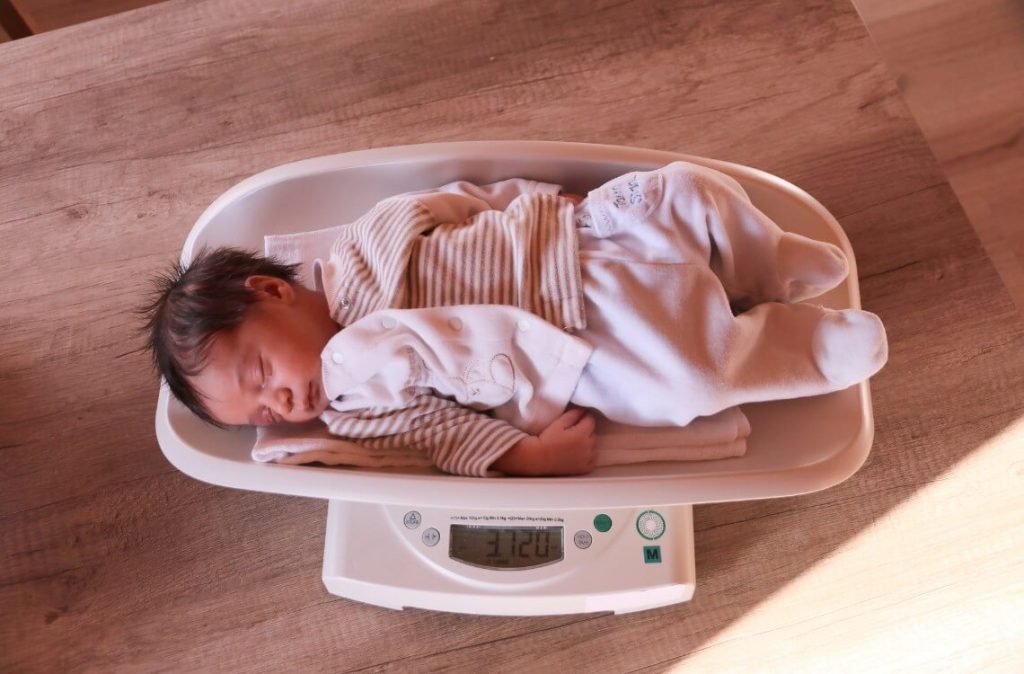Concerned about your baby’s weight gain? No need to worry!
We’ve compiled a comprehensive guide that offers ten practical tips to help your little one thrive.
So let’s dive in and learn together.
The Importance of a Healthy Baby Weight Gain
Healthy baby weight gain is of paramount importance for numerous reasons.
First and foremost, it is a fundamental indicator of your baby’s overall health and well-being.
It signifies that your little one is receiving adequate nutrition necessary to develop their vital organs, bones, and brain properly.
Moreover, it reflects a healthy balance between their calorie intake and expenditure, which is essential for their metabolic functioning.
Furthermore, a steady weight gain is crucial for your baby’s immune system, helping them fend off illnesses and infections more effectively.
Thus, ensuring a healthy baby weight gain is integral to their growth, development, and long-term health outcomes.
1. Understanding Growth Charts
Babies, like adults, come in all sizes and shapes.
Hence, growth charts, often provided by your children’s hospital, are an essential tool for tracking your baby’s growth over time.
These charts allow you to compare your baby’s progress with other kids of the same age and gender.
If your baby falls below the 50th percentile, that doesn’t always mean something’s wrong. Remember, every baby grows at their own pace.
However, consult your paediatrician if there’s consistent underweight or weight loss.
2. Feeding in a Timely Manner
It might sound an understatement, but feeding your baby on time is crucial.
Newborns should be fed every 2-3 hours, while older babies might only need to be provided every 3-4 hours.
Also, nighttime feeding is essential to ensure consistent weight gain.
3. Special Considerations for Premature Babies
Premature babies often require special care to catch up in weight.
They might need a higher calorie intake compared to full-term babies.
Regular check-ups and growth tracking are essential.
Additionally, always adhere to the feeding and care instructions given by your children’s hospital’s neonatal intensive care unit (NICU).
4. Identifying and Managing Food Allergies
Food allergies can affect your baby’s ability to gain weight.
Therefore, you should look out for signs of food allergies, including hives, diarrhoea, vomiting, and even difficulty breathing.
If you suspect a food allergy, seek medical advice immediately.
Also, your doctor can guide you on identifying allergens and recommending safe alternatives.
5. Introduction to Solid Foods
Introducing solid foods is a milestone in your baby’s growth.
However, it’s essential to do this at the right time, typically around six months of age.
Start with pureed fruits and vegetables and gradually move to more substantial foods.
So, be mindful of potential allergies, introducing one food at a time to identify any adverse reactions.
6. Ensuring Balanced Nutrition
A balanced diet promotes healthy growth and weight gain.
Ensure that your baby’s diet includes all necessary nutrients such as proteins, carbohydrates, fats, vitamins, and minerals.
The exact proportions will change as your baby grows, so stay informed and adjust the diet accordingly.
7. Peer Reviewed Information: A Reliable Resource
Seeking advice from peer-reviewed sources is a smart move for parents.
This ensures the advice you receive is backed by scientific evidence.
At the same time, journals, academic papers, and health websites often provide peer-reviewed information.
8. Regular Check-ups at Children’s Hospital
Regular check-ups are essential to monitor your baby’s growth and development.
Here, your paediatrician can provide valuable advice tailored to your baby’s unique needs.
Therefore, if you have concerns about your baby’s weight gain, please bring it up at these visits.
9. Physical Activity for the Baby
Even though your baby can’t hit the gym just yet, physical activity is essential to healthy growth.
Tummy time, reaching for toys, and crawling are all forms of exercise that can help your baby gain weight while strengthening their muscles.
10. Monitoring Your Baby’s Progress
Finally, tracking your baby’s progress is key to ensuring healthy growth.
Monitor their weight gains, monitor feeding habits, and note any changes in behaviour or activity levels.
If you notice any concerning changes, consult your healthcare provider promptly.
Conclusion
Remember, every baby is unique and grows at their own pace.
If your little one isn’t quite catching up with the growth charts, don’t fret.
With the right steps, your baby can gain weight healthily. After all, being a parent is a journey filled with challenges, joy, and much love.
Stay informed, remain vigilant, and most importantly, enjoy this beautiful journey of parenthood!
Remember, if you found this article helpful, do share it with your fellow parents. After all, it takes a village to raise a child!
Disclaimer: The information provided in this article is for informational purposes only and should not be considered as medical advice from Motherhood. For any health-related concerns, it is advisable to consult with a qualified healthcare professional or medical practitioner.
For more insightful stories and fun recipes, stay tuned to Motherhood Story!
